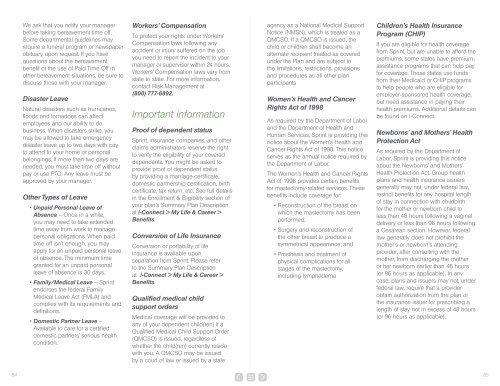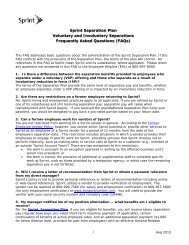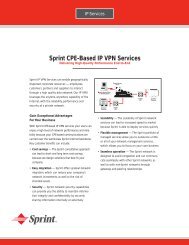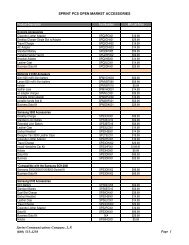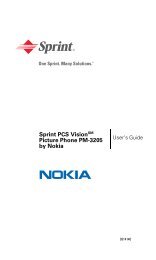2013 Sprint Benefits Guide
2013 Sprint Benefits Guide
2013 Sprint Benefits Guide
Create successful ePaper yourself
Turn your PDF publications into a flip-book with our unique Google optimized e-Paper software.
We ask that you notify your manager<br />
before taking bereavement time off.<br />
Some departmental guidelines may<br />
require a funeral program or newspaper<br />
obituary upon request. If you have<br />
questions about the bereavement<br />
benefit or the use of Paid Time Off in<br />
other bereavement situations, be sure to<br />
discuss those with your manager.<br />
Disaster Leave<br />
Natural disasters such as hurricanes,<br />
floods and tornadoes can affect<br />
employees and our ability to do<br />
business. When disasters strike, you<br />
may be allowed to take emergency<br />
disaster leave up to two days with pay<br />
to attend to your home or personal<br />
belongings. If more than two days are<br />
needed, you must take time off without<br />
pay or use PTO. Any leave must be<br />
approved by your manager.<br />
Other Types of Leave<br />
• Unpaid Personal Leave of<br />
Absence – Once in a while,<br />
you may need to take extended<br />
time away from work to manage<br />
personal obligations. When paid<br />
time off isn’t enough, you may<br />
apply for an unpaid personal leave<br />
of absence. The minimum time<br />
granted for an unpaid personal<br />
leave of absence is 30 days.<br />
• Family/Medical Leave – <strong>Sprint</strong><br />
endorses the federal Family<br />
Medical Leave Act (FMLA) and<br />
complies with its requirements and<br />
definitions.<br />
• Domestic Partner Leave –<br />
Available to care for a certified<br />
domestic partners’ serious health<br />
condition.<br />
Workers’ Compensation<br />
To protect your rights under Workers’<br />
Compensation laws following any<br />
accident or injury suffered on the job<br />
you need to report the incident to your<br />
manager or supervisor within 24 hours.<br />
Workers’ Compensation laws vary from<br />
state to state. For more information,<br />
contact Risk Management at<br />
(800) 777-6892.<br />
Important information<br />
Proof of dependent status<br />
<strong>Sprint</strong>, insurance companies, and other<br />
claims administrators reserve the right<br />
to verify the eligibility of your covered<br />
dependents. You might be asked to<br />
provide proof of dependent status<br />
by providing a marriage certificate,<br />
domestic partnership certification, birth<br />
certificate, tax return, etc. See full details<br />
in the Enrollment & Eligibility section of<br />
your plan’s Summary Plan Description<br />
at i-Connect > My Life & Career ><br />
<strong>Benefits</strong>.<br />
Conversion of Life Insurance<br />
Conversion or portability of life<br />
insurance is available upon<br />
separation from <strong>Sprint</strong>. Please refer<br />
to the Summary Plan Description<br />
at i-Connect > My Life & Career ><br />
<strong>Benefits</strong>.<br />
Qualified medical child<br />
support orders<br />
Medical coverage will be provided to<br />
any of your dependent child(ren) if a<br />
Qualified Medical Child Support Order<br />
(QMCSO) is issued, regardless of<br />
whether the child(ren) currently reside<br />
with you. A QMCSO may be issued<br />
by a court of law or issued by a state<br />
agency as a National Medical Support<br />
Notice (NMSN), which is treated as a<br />
QMCSO. If a QMCSO is issued, the<br />
child or children shall become an<br />
alternate recipient treated as covered<br />
under the Plan and are subject to<br />
the limitations, restrictions, provisions<br />
and procedures as all other plan<br />
participants<br />
Women’s Health and Cancer<br />
Rights Act of 1998<br />
As required by the Department of Labor<br />
and the Department of Health and<br />
Human Services, <strong>Sprint</strong> is providing this<br />
notice about the Women’s Health and<br />
Cancer Rights Act of 1998. This notice<br />
serves as the annual notice required by<br />
the Department of Labor.<br />
The Women’s Health and Cancer Rights<br />
Act of 1998 provides certain benefits<br />
for mastectomy-related services. These<br />
benefits include coverage for:<br />
• Reconstruction of the breast on<br />
which the mastectomy has been<br />
performed;<br />
• Surgery and reconstruction of<br />
the other breast to produce a<br />
symmetrical appearance; and<br />
• Prosthesis and treatment of<br />
physical complications for all<br />
stages of the mastectomy,<br />
including lymphedema<br />
Children’s Health Insurance<br />
Program (CHIP)<br />
If you are eligible for health coverage<br />
from <strong>Sprint</strong>, but are unable to afford the<br />
premiums, some states have premiumassistance<br />
programs that can help pay<br />
for coverage. These states use funds<br />
from their Medicaid or CHIP programs<br />
to help people who are eligible for<br />
employer-sponsored health coverage,<br />
but need assistance in paying their<br />
health premiums. Additional details can<br />
be found on i-Connect.<br />
Newborns’ and Mothers’ Health<br />
Protection Act<br />
As required by the Department of<br />
Labor, <strong>Sprint</strong> is providing this notice<br />
about the Newborns’ and Mothers’<br />
Health Protection Act. Group health<br />
plans and health insurance issuers<br />
generally may not, under federal law,<br />
restrict benefits for any hospital length<br />
of stay in connection with childbirth<br />
for the mother or newborn child to<br />
less than 48 hours following a vaginal<br />
delivery or less than 96 hours following<br />
a Cesarean section. However, federal<br />
law generally does not prohibit the<br />
mother’s or newborn’s attending<br />
provider, after consulting with the<br />
mother, from discharging the mother<br />
or her newborn earlier than 48 hours<br />
(or 96 hours as applicable). In any<br />
case, plans and issuers may not, under<br />
federal law, require that a provider<br />
obtain authorization from the plan or<br />
the insurance issuer for prescribing a<br />
length of stay not in excess of 48 hours<br />
(or 96 hours as applicable).<br />
84<br />
85


